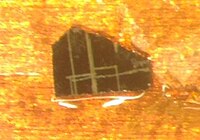Yttrium barium copper oxide
 |
|
 |
|
| Names | |
|---|---|
|
IUPAC name
barium copper yttrium oxide
|
|
| Other names
YBCO, Y123, yttrium barium cuprate
|
|
| Identifiers | |
| ECHA InfoCard | 100.121.379 |
| Properties | |
| YBa2Cu3O7 | |
| Molar mass | 666.19 g/mol |
| Appearance | Black solid |
| Density | 6.3 g/cm3 |
| Melting point | >1000 °C |
| Insoluble | |
| Structure | |
| Based on the perovskite structure. | |
| Orthorhombic | |
| Hazards | |
|
EU classification (DSD)
|
Irritant (Xi) |
| Related compounds | |
|
Related high-Tc
superconductors |
La2-xSrxCuO4 (LSCO) |
|
Related compounds
|
Yttrium(III) oxide Barium oxide Copper(II) oxide |
|
Except where otherwise noted, data are given for materials in their standard state (at 25 °C [77 °F], 100 kPa).
|
|
|
|
|
| Infobox references | |
Yttrium barium copper oxide (YBCO) is a family of crystalline chemical compounds, famous for displaying high-temperature superconductivity. It includes the first material ever discovered to become superconducting above the boiling point of liquid nitrogen (77 K) at about 90 K. Many YBCO compounds have the general formula YBa2Cu3O7-x (also known as Y123), although materials with other Y:Ba:Cu ratios exist, such as YBa2Cu4Oy (Y124) or Y2Ba4Cu7Oy (Y247).
In April 1986, Georg Bednorz and Karl Müller, working at IBM in Zurich, discovered that certain semiconducting oxides became superconducting at relatively high temperature, in particular, a lanthanum barium copper oxide which becomes superconducting at 35 K. This oxide was an oxygen deficient perovskite-related material that proved promising, and stimulated the search for related compounds with higher superconducting transition temperatures. In 1987, Bednorz and Müller were jointly awarded the Nobel Prize in Physics for this work.
Following Bednorz and Müller's work, in 1987 Maw-Kuen Wu and Chu Ching-wu and their graduate students Ashburn and Torng at the University of Alabama in Huntsville, discovered that YBCO has a critical temperature (Tc) of 93 K. (The first samples were Y1.2Ba0.8CuO4.) That paper led to rapid discovery of several new high temperature superconducting materials, ushering in a new era in material science and chemistry.
...
Wikipedia
